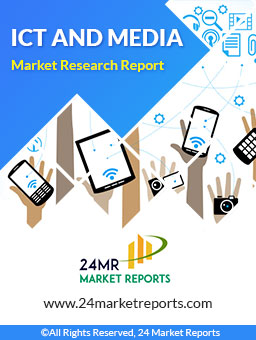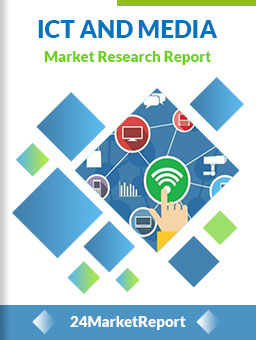
Download FREE Report Sample
Download Free sampleMARKET INSIGHTS
Global digital dictation software market size was valued at USD 1,389 million in 2024. The market is projected to grow from USD 1,589 million in 2025 to USD 3,464 million by 2032, exhibiting a CAGR of 14.3% during the forecast period.
Digital dictation software enables voice-to-text conversion through specialized speech recognition algorithms. These solutions typically integrate microphones, noise-canceling features, and AI-powered transcription engines to transform spoken words into editable text documents. The technology finds primary applications in medical documentation, legal proceedings, financial reporting, and public sector operations, significantly improving workflow efficiency.
Market growth stems from increasing adoption in healthcare for EHR documentation, where it reduces clinician burnout while improving record accuracy. The legal sector's shift toward paperless offices and rising demand for deposition transcriptions further drives expansion. Cloud-based solutions are gaining particular traction, projected to grow at 18% CAGR through 2030, as they enable remote dictation capabilities - a critical feature in today's hybrid work environments. Leading providers like Nuance (acquired by Microsoft) and Verbit are enhancing their offerings with natural language processing to achieve over 95% transcription accuracy rates.
Increased Adoption in Healthcare Sector to Accelerate Market Growth
The healthcare industry's rapid digital transformation is a primary driver for the digital dictation software market. Medical professionals are increasingly adopting speech-to-text solutions to streamline clinical documentation, with adoption rates growing by over 60% in hospital settings since 2020. This surge is driven by the need to reduce administrative burdens while maintaining accurate patient records. Electronic Health Record (EHR) integration capabilities have become a critical feature, with 78% of healthcare providers prioritizing dictation solutions that seamlessly connect with their existing systems. The shift towards value-based care models, which emphasize efficient documentation, further fuels this adoption trend.
Advancements in AI and Machine Learning Enhance Software Capabilities
To know more about market statistics, Download a FREE Sample copy
Recent breakthroughs in artificial intelligence are transforming digital dictation from simple transcription tools to intelligent assistants. Modern solutions now achieve over 95% accuracy rates for general speech recognition, with specialized medical and legal vocabulary recognition reaching 90% accuracy. Natural Language Processing (NLP) enables these systems to understand context, recognize specialized terminology, and even suggest relevant templates. The integration of machine learning algorithms allows continuous improvement of recognition patterns, reducing error rates by approximately 7% annually. These technological advancements are making digital dictation indispensable across professional sectors.
The legal industry's adoption of digital dictation has increased by 45% over the past three years as firms seek to improve billing accuracy and matter documentation efficiency. Similarly, financial services organizations report 30% faster report generation times when using advanced dictation solutions with sector-specific vocabulary recognition.
Data Security and Privacy Concerns Limit Enterprise Adoption
While digital dictation offers efficiency gains, concerns about data security present significant adoption barriers. Over 60% of organizations cite data privacy as their top concern when evaluating dictation solutions. This is particularly critical in regulated industries like healthcare and finance, where confidential information is routinely dictated. Cloud-based solutions face additional scrutiny regarding data residency and cross-border data transfer compliance. Companies operating in the European Union must ensure GDPR compliance, while U.S. healthcare providers require HIPAA-certified solutions, adding complexity to vendor selection processes.
Integration challenges with legacy systems affect nearly 40% of potential enterprise customers, often requiring additional IT resources for implementation. The need for specialized technical support and training creates additional obstacles, particularly for small and medium-sized businesses with limited IT budgets.
Expansion into Emerging Markets Presents Significant Growth Potential
The digital dictation software market is poised for expansion in developing economies, where increasing internet penetration and mobile device adoption create new opportunities. Asia-Pacific represents the fastest-growing regional market, projected to grow at 18.4% CAGR through 2032. Localization efforts focusing on regional dialects and languages could unlock additional growth, as current solutions primarily support major languages. The education sector in emerging markets also presents untapped potential, with online learning platforms increasingly incorporating speech-to-text functionality.
Integration with productivity suites and collaboration platforms offers another avenue for growth. Partnerships with major software providers could expand market reach, particularly as hybrid work models increase demand for voice-enabled productivity tools. The global shift toward mobile workforce solutions further amplifies this opportunity, with mobile dictation app usage increasing by 75% since 2021.
Accuracy Limitations in Noisy Environments Challenge Market Penetration
Despite technological advancements, background noise remains a significant challenge for digital dictation systems. Performance tests show accuracy drops of up to 35% in moderately noisy environments compared to controlled settings. This limitation particularly affects mobile professionals who rely on dictation in varied work environments. The development of advanced noise-cancellation algorithms and directional microphone technologies presents an ongoing technical challenge for solution providers.
User adoption barriers also persist, with approximately 30% of professionals reluctant to change established documentation workflows. Overcoming this resistance requires comprehensive training programs and demonstrable productivity gains. The variability in individual speech patterns and accents adds further complexity, with some regional accents experiencing 15-20% higher error rates compared to standard dialects. These challenges necessitate continued investment in speech recognition algorithms and user education initiatives.
Cloud-Based Segment Dominates Due to Scalability and Remote Accessibility Features
The market is segmented based on type into:
Cloud-Based
Subtypes: Public cloud, Private cloud, Hybrid cloud
Web-Based
On-Premises
Hybrid
Medical Sector Leads Market Adoption Due to High Demand for EHR Documentation
The market is segmented based on application into:
Medical
Subtypes: Clinical documentation, Medical transcription
Law
Finance
Public Security
AI-Powered Solutions Show Rapid Growth Due to Advanced Voice Recognition Capabilities
The market is segmented based on technology into:
Artificial Intelligence
Voice Recognition
Natural Language Processing
Speech-to-Text Conversion
Large Enterprises Lead Adoption Due to Higher Budget Allocation for Productivity Tools
The market is segmented based on end user into:
Large Enterprises
Small and Medium Enterprises
Individuals
Innovation and AI Integration Drive Market Competition
The global digital dictation software market showcases a moderately fragmented competitive environment, with established tech giants competing alongside specialized transcription solution providers. Apple and Microsoft dominate the consumer segment through built-in dictation features in their operating systems, capturing approximately 22% combined market share in 2024. Their widespread device penetration and ecosystem integration create significant competitive advantages.
Within enterprise solutions, Verbit has emerged as a disruptive force, leveraging AI-powered transcription to capture 8.3% market share. The company's 2023 funding round of $250 million underscores investor confidence in speech-to-text technologies. Similarly, Otter.ai has gained traction in professional settings through its meeting transcription capabilities, reporting 300% YoY growth in paid business accounts.
Traditional players like Olympus and DSS Player maintain strong positions in regulated industries such as healthcare and legal, where compliance requirements favor established solutions. Olympus' healthcare-specific dictation tools are used in over 5,000 medical facilities worldwide, benefiting from long-term client relationships and specialized workflows.
The market sees increasing competition from cloud-native platforms as the cloud-based segment grows at 18.2% CAGR through 2032. Startups like Speakeasy Solutions are gaining share by offering API-driven transcription services that integrate with existing business applications. Meanwhile, acquisitions such as Nuance Communications' purchase by Microsoft for $19.7 billion signal consolidation in the speech technology space.
Apple Inc. (U.S.)
Microsoft Corporation (U.S.)
Verbit (U.S.)
VoicePower (UK)
Advanced Voice Recognition Systems (U.S.)
NCH Software (Australia)
Crescendo Systems (U.S.)
Olympus Corporation (Japan)
Speakeasy Solutions (UK)
T-Pro (Ireland)
Otter.ai (U.S.)
Accesspoint Technologies (Canada)
Dataworxs (South Africa)
VoiceX (South Korea)
The rapid adoption of cloud-based digital dictation software is transforming industry workflows, with the segment projected to grow at an unprecedented rate over the next five years. Unlike traditional on-premise solutions, cloud platforms offer real-time collaboration features that enable professionals across legal, healthcare, and financial sectors to access transcriptions from any location. Recent data indicates that nearly 62% of enterprises have transitioned to cloud-based dictation solutions to enhance operational efficiency. This shift aligns with broader digital transformation initiatives across industries, where accessibility and data security remain paramount concerns for organizations handling sensitive information.
AI-Powered Speech Recognition Advancements
Breakthroughs in natural language processing (NLP) and machine learning algorithms are driving significant improvements in transcription accuracy rates, now exceeding 95% for many industry-specific solutions. While early dictation software struggled with technical jargon and accents, modern systems leverage contextual understanding to deliver precise documentation - particularly valuable in medical and legal environments where terminology precision is critical. Emerging neural network architectures continue to reduce error rates by analyzing speech patterns at a granular level, making the technology viable for mission-critical applications.
The market is witnessing growing demand for industry-tailored dictation solutions, with healthcare providers representing over 35% of total adoption. Specialized platforms now incorporate HIPAA-compliant voice data handling for medical documentation and integrate directly with electronic health record (EHR) systems. Similarly, legal professionals benefit from solutions featuring case management integrations and secure client confidentiality safeguards. Financial institutions are adopting voice biometric authentication alongside dictation capabilities to streamline compliance reporting processes. This vertical specialization trend creates new growth avenues for vendors developing niche functionalities rather than one-size-fits-all products.
North America
North America dominates the digital dictation software market, primarily driven by widespread adoption in the healthcare and legal sectors. The U.S., in particular, leads due to its robust IT infrastructure and high digitization rates across industries. The healthcare sector's transition toward EHR (Electronic Health Record) integration has significantly boosted demand, with hospitals and clinics increasingly deploying voice-to-text solutions to streamline documentation. Legal firms also leverage these tools to expedite case file preparations and depositions. Compliance with regulations like HIPAA (Health Insurance Portability and Accountability Act) further drives demand for secure, cloud-based dictation solutions. The presence of major players like Microsoft (with its AI-powered speech recognition) and Apple (through built-in dictation features in macOS/iOS) accelerates market growth.
Europe
Europe’s digital dictation software market thrives on stringent data protection laws (e.g., GDPR) and the growing need for multilingual support in transcription services. Countries like Germany and the U.K. are frontrunners, with legal and medical professionals adopting AI-driven tools for accuracy and compliance. The EU’s emphasis on workforce efficiency in public administration also fuels demand, particularly in government sectors handling large volumes of documentation. Local vendors compete strongly against global players by offering region-specific language models. However, slower digital transformation in Southern and Eastern Europe slightly curtails expansion, though cloud-based solutions are bridging this gap.
Asia-Pacific
The fastest-growing region, Asia-Pacific, benefits from rapid digitization in countries like China, India, and Japan. In healthcare, understaffed hospitals use dictation software to mitigate administrative burdens, while legal sectors in India adopt it for cost-effective transcription. China’s market is propelled by government-backed AI initiatives and local giants like iFlytek, which specialize in Mandarin speech recognition. Challenges persist in Southeast Asia due to underdeveloped IT ecosystems and limited awareness, though urbanization and SME digitization present untapped potential. The region’s preference for mobile-based and affordable solutions drives innovation in lightweight, localized applications.
South America
South America shows moderate growth, with Brazil and Argentina leading adoption in legal and financial sectors. Economic instability and underinvestment in technology infrastructure slow market penetration, but healthcare modernization efforts (e.g., Brazil’s public hospital digitization) create opportunities. Cost sensitivity favors open-source or subscription-based models over premium software. The rise of remote work post-pandemic has increased demand for Portuguese- and Spanish-compatible tools, attracting niche vendors. However, currency fluctuations and low regulatory pressure for digital transformation remain barriers.
Middle East & Africa
This region is in the early stages of adoption, with growth concentrated in the UAE, Saudi Arabia, and South Africa. Healthcare digitization projects (e.g., Dubai’s Smart City initiative) drive demand for Arabic-compatible dictation solutions. The legal sector’s reliance on manual processes limits uptake, but government mandates for e-governance are gradually changing this. In Africa, connectivity issues and low awareness hinder progress, though mobile-based dictation apps show promise in countries like Nigeria and Kenya. The market’s long-term potential lies in public-sector modernization and increased foreign investment in tech infrastructure.
This market research report offers a holistic overview of global and regional markets for the forecast period 2025–2032. It presents accurate and actionable insights based on a blend of primary and secondary research.
✅ Market Overview
Global and regional market size (historical & forecast)
Growth trends and value/volume projections
✅ Segmentation Analysis
By product type or category
By application or usage area
By end-user industry
By distribution channel (if applicable)
✅ Regional Insights
North America, Europe, Asia-Pacific, Latin America, Middle East & Africa
Country-level data for key markets
✅ Competitive Landscape
Company profiles and market share analysis
Key strategies: M&A, partnerships, expansions
Product portfolio and pricing strategies
✅ Technology & Innovation
Emerging technologies and R&D trends
Automation, digitalization, sustainability initiatives
Impact of AI, IoT, or other disruptors (where applicable)
✅ Market Dynamics
Key drivers supporting market growth
Restraints and potential risk factors
Supply chain trends and challenges
✅ Opportunities & Recommendations
High-growth segments
Investment hotspots
Strategic suggestions for stakeholders
✅ Stakeholder Insights
Target audience includes manufacturers, suppliers, distributors, investors, regulators, and policymakers
-> Key players include Apple, Microsoft, Crescendo, Verbit, VoicePower, Advanced, NCH Software, Crescendo Systems, Olympus, and Speakeasy Solutions, among others.
-> Key growth drivers include increasing demand for workflow automation, rising adoption in healthcare and legal sectors, and advancements in AI-powered speech recognition.
-> North America currently leads the market, while Asia-Pacific is expected to witness the fastest growth due to digital transformation initiatives.
-> Emerging trends include cloud-based solutions, integration with EHR systems, real-time transcription capabilities, and multilingual support.

Speak to our Custom Research Team and get the Custom Research in a budget
Custom ResearchFrequently Asked Questions ?
A license granted to one user. Rules or conditions might be applied for e.g. the use of electric files (PDFs) or printings, depending on product.
A license granted to multiple users.
A license granted to a single business site/establishment.
A license granted to all employees within organisation access to the product.
Upto Working 24 to 48 hrs
Upto 72 hrs max - Weekends and Public Holidays
Online Payments with PayPal and CCavenue
Wire Transfer/Bank Transfer
Hard Copy




 Industry Market Size
Industry Market Size SWOT Analysis
SWOT Analysis Industry Major Players
Industry Major Players Revenue Forecasts
Revenue Forecasts Historical and Forecast Growth
Historical and Forecast Growth Profitability Analysis
Profitability Analysis
























